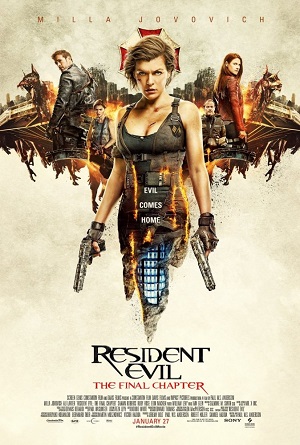Resident Evil: The Final Chapter?
Yeah, right.
There’s a long tradition of venerable horror franchises claiming that their latest installment is “the final chapter.” The Friday the 13th franchise declared that the fourth part would be the final chapter and then promptly announced that part five would be a new beginning. As long as a franchise is still making a profit, nothing truly ends. Resident Evil: The Final Chapter basically admits that at the end of its final chapter, when one of the surviving characters literally announces that the mission is not over.
Anyway, Resident Evil: The Not-So Final Chapter will probably seem totally incoherent to anyone who has not watched the previous film. To be honest, even though I’ve seen the other Resident Evil films, I always have a hard time working my way through the franchise’s dense mythology. There are times when I suspect that, much like the Underworld films, the Resident Evil films were specifically designed to mess with my ADD. That said, the Resident Evil franchise has never made a secret about being more concerned with spectacle and action than with narrative coherence. If you’re the type who obsesses of the lack of logic and plausibility in a horror-action film based on a video game, then you’re not the right audience for Resident Evil.
The Final Chapter finds Alice (Milla Jovovich) right where the previous Resident Evil film left her, in the ruins of the White House. The world is still zombiefied and monsterfied, all as a result of the nefarious work of the Umbrella Corporation. Alice is contacted by the Red Queen (Ever Gabo Anderson), who explains that Alice needs to return to Raccoon City and invade the Hive before Umbrella releases yet another virus. Alice travels back the Hive, which leads to several of Resident Evil‘s trademark, over-the-top action sequences. Along the way, a lot of familiar faces pop up. Alice is reunited with Claire (Ali Larter). Dr. Alexander Isaacs (Iain Glen) shows up, explaining that the Isaacs who Alice killed a few movies ago was actually just a clone. (No one ever dies in Resident Evil. Instead, they just get cloned.)
Of course, Albert Wesker returns as well. Ever since Resident Evil: Afterlife, Wesker has been played by a Canadian actor named Shawn Roberts. Watching The Final Chapter, it took me only a few seconds to realize that Shawn Roberts also played Dean the Rapist in five episodes of Degrassi: The Next Generation. That storyline, in which Dean raped Paige and it then took two years (and two seasons) for the case to go to trial just to end with Dean getting acquitted and smirking at Paige as he left the courtroom, remains one of Degrassi‘s most powerful storylines. Roberts uses that same smirk while playing Wesker.
Paul W. S. Anderson returns to direct The Final Chapter. Though Anderson seems to be destined to be best known as “that other director named Paul Anderson,” he’s actually pretty good when it comes to directing nonstop action. (For the record, I thought Anderson’s Pompeii was a sadly underrated film.) The Final Chapter is fun and silly as long as you don’t waste any time to thinking about it and Anderson keeps the action coming so quickly that you literally don’t have time to worry about whether or not the movie makes any sense. The film’s prologue, in which a boy gets zombiefied on a cable car, was actually pretty exciting and a reminder of the visceral horror that it is at the heart of all zombie films.
Resident Evil: The Final Chapter was released in January and, despite some decidedly mixed review, it became the highest grossing film in the franchise. In other words, this is definitely not the final chapter…

I like the RESIDENT EVIL movies for exactly the reasons you name. They specialize in outrageous, over-the-top action sequences and they’re movies that are designed for nothing else than to be the filmic equivalent of a Big Mac, large fries and supersized Coke. And sometimes that’s all you’re in the mood for.
LikeLike
Pingback: Film Review: Insidious: The Last Key (dir by Adam Robitel) | Through the Shattered Lens